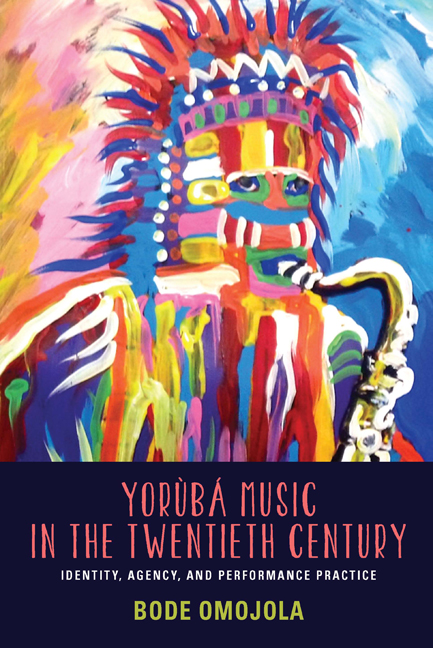Book contents
- Frontmatter
- Dedication
- Contents
- Acknowledgments
- Introduction
- 1 Yorùbá Drumming: Performance Practice and the Politics of Identity
- 2 Talking and Stammering: Toward an Analysis of Yorùbá Drumming
- 3 Songs of the King’s Wives: Gendered and Social Identities in Yorùbá Vocal Performance
- 4 The Aírégbé Song Tradition of Yorùbá Female Chiefs
- 5 Yorùbá Music in the Christian Liturgy: Notation, Performance, and Identity
- 6 Yorùbá Music in Christian Worship: The Aládǔrà Church
- 7 Yorùbá Popular Music: Hybridity, Identity, and Power
- 8 Yorùbá Islamic Popular Music
- Conclusion
- Appendixes
- Notes
- Selected Discography and Videography
- Bibliography
- Index
6 - Yorùbá Music in Christian Worship: The Aládǔrà Church
Published online by Cambridge University Press: 11 January 2024
- Frontmatter
- Dedication
- Contents
- Acknowledgments
- Introduction
- 1 Yorùbá Drumming: Performance Practice and the Politics of Identity
- 2 Talking and Stammering: Toward an Analysis of Yorùbá Drumming
- 3 Songs of the King’s Wives: Gendered and Social Identities in Yorùbá Vocal Performance
- 4 The Aírégbé Song Tradition of Yorùbá Female Chiefs
- 5 Yorùbá Music in the Christian Liturgy: Notation, Performance, and Identity
- 6 Yorùbá Music in Christian Worship: The Aládǔrà Church
- 7 Yorùbá Popular Music: Hybridity, Identity, and Power
- 8 Yorùbá Islamic Popular Music
- Conclusion
- Appendixes
- Notes
- Selected Discography and Videography
- Bibliography
- Index
Summary
The use of sacred music as a form of therapy is a performance practice that has only just begun to attract the attention of Africanist ethnomusicologists. In a study conducted among the Tumbuka people of northern Malawi, for example, Stephen Friedson focuses on how sacred musical performances in which prophets, spirit mediums, and patients constitute a community of worshippers and engage in an interactive musical activity function as a medium for attaining social, physical, and spiritual healing. Musical sounds and dance in such contexts provide the nexus for attaining spiritual and “cultural truth,” and function as a medium through which members of a religious community work together to seek solutions to, and overcome or cope with, various challenges of life. Carol Muller discusses how female congregational members of the ibandla lamaNazaretha (the Church of Nazarite) explored the religious grounds of Shembe's Africanist church and the cultural forms of music and dance to create a space of safety and comfort—an oasis, so to speak—within the turbulent political and social environment of apartheid South Africa. For these women, music and dance performances combining Western and traditional Zulu elements provided a liberating medium for gaining back a sense of freedom that was suppressed in the “context of everyday struggle, violation and violence” in South Africa.
Participation in such religious and cultural forms helped to engender a sense of freedom and security, and provided a “respite from the common experience of pain and fragmentation.” The “narrative discourses on the miraculous,” expressed within the ambience of religious song, dance, dream, and narrative, constituted a “means of claiming cultural truth, because the state was increasingly rendering other domains—the political and economic—inaccessible” to native South Africans. The performance elements of song, drumming, and dance as realized within the context of an African-mediated form of Christianity constituted a “privileged operational zone” and a temporary escape from the hegemonic and socially oppressive environment of apartheid South Africa. With reference to Foucault, Muller explains that the performance and religious activities of the women of the ibandla lamaNazaretha illustrate a situation whereby “expressive domains elaborate on the nature of social experience and (function as) a “technology for self-disclosure.”
- Type
- Chapter
- Information
- Yorùbá Music in the Twentieth CenturyIdentity, Agency, and Performance Practice, pp. 136 - 161Publisher: Boydell & BrewerPrint publication year: 2014



